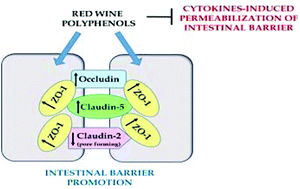Red wine extract preserves tight junctions in intestinal epithelial cells under inflammatory conditions: implications for intestinal inflammation
Abstract
The altered expression and subcellular distribution of tight junction (TJ) proteins, leading to a dysfunctional intestinal barrier, is a key mechanistic feature of inflammatory bowel disease (IBD). Therefore, increasing the integrity of the intestinal barrier by manipulating the TJ may constitute an innovative and effective therapeutic strategy in IBD. In this context, recent studies showed that dietary polyphenols are able to protect the intestinal TJ barrier integrity. Here, using a cellular model of intestinal inflammation, consisting of cytokine-stimulated HT-29 colon epithelial cells, we show that a polyphenolic extract obtained from Portuguese red wine (RWE) decreased the paracellular permeability across the cell monolayer compared with the control cells, even in the presence of pro-inflammatory cytokines. The beneficial effect of RWE was exerted at three complementary levels: (1) by promoting a significant increase of the mRNA of key barrier-forming TJ proteins, including occludin, claudin-5 and zonnula occludens (ZO)-1 above the levels observed in the control cells; (2) by preventing the decrease in the expression of these proteins under inflammatory conditions and (3) by averting the increase in claudin-2 mRNA, a channel-forming TJ protein induced by pro-inflammatory cytokines. Taken together, these results strongly suggest that polyphenols presented and consumed in red wine as a mixture can reinforce and protect the intestinal barrier against inflammatory stimulus by affecting the TJ protein expression and, thus, without the need for purifying individual compounds, might represent a readily available therapeutic intervention against IBD and intestinal inflammation.

- This article is part of the themed collection: Around the Supermarket: Staple Foods


 Please wait while we load your content...
Please wait while we load your content...